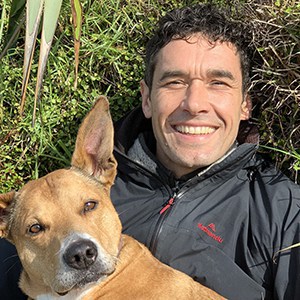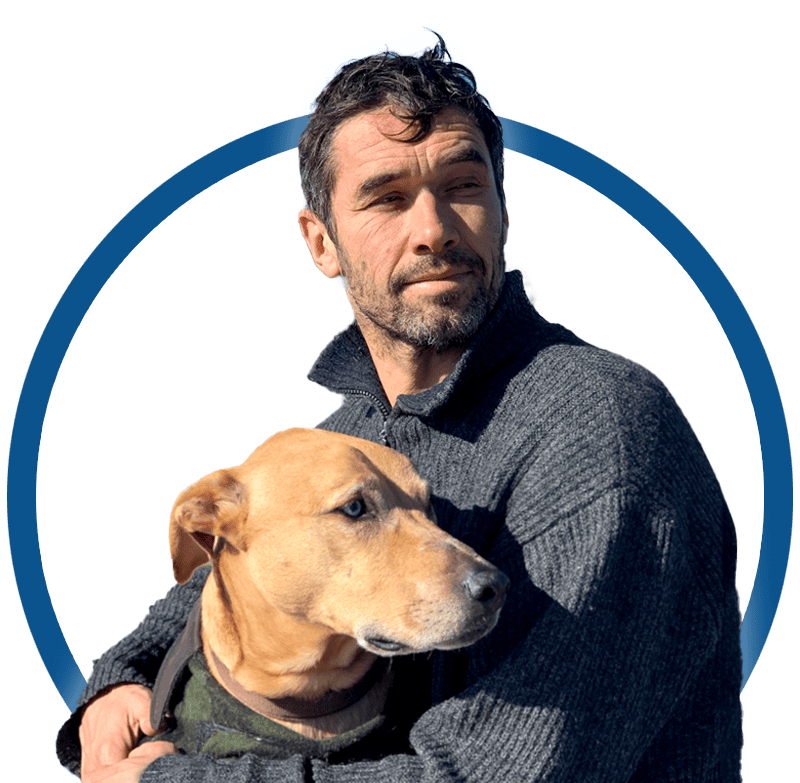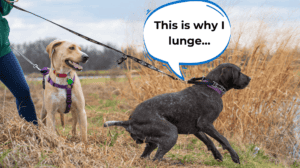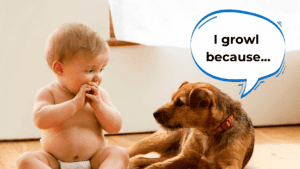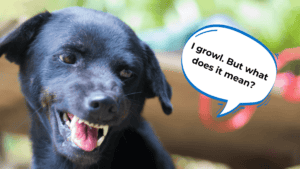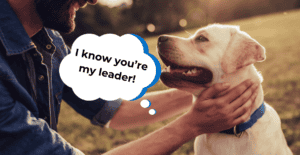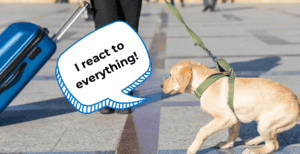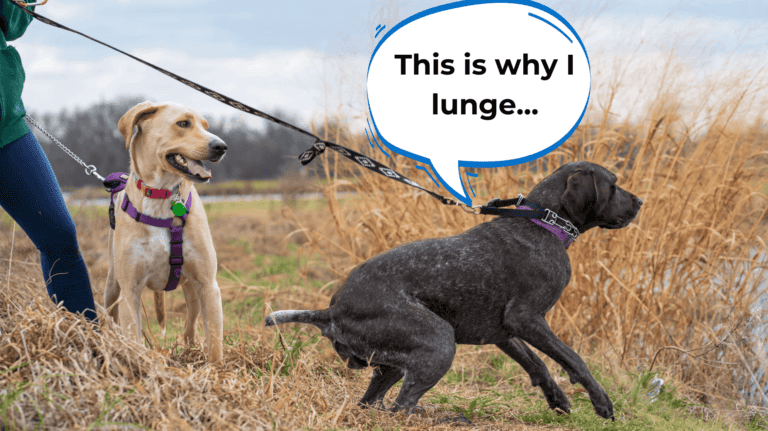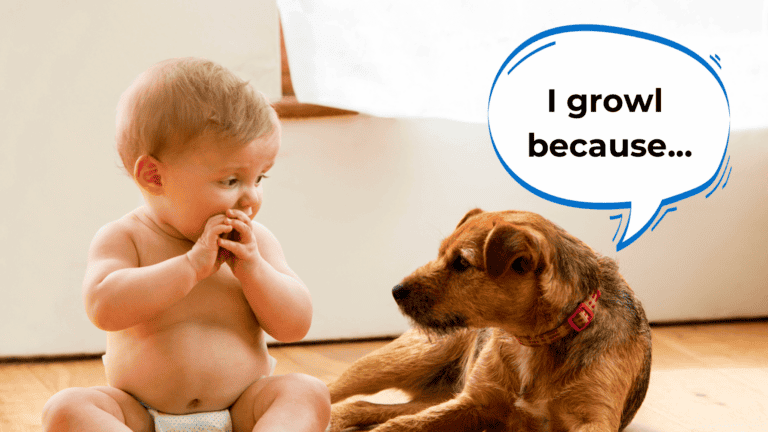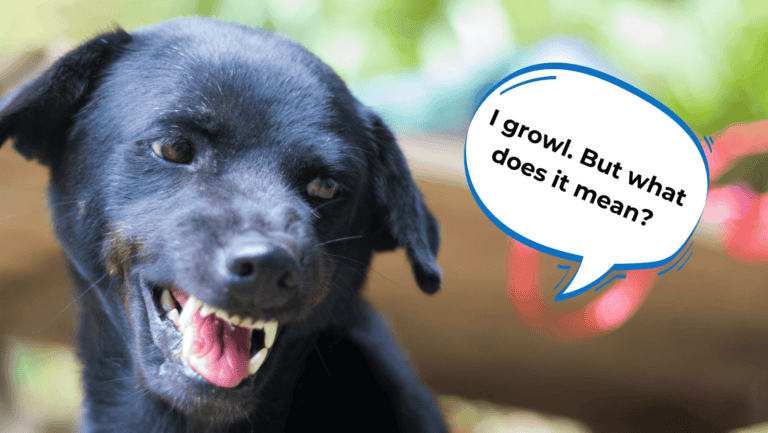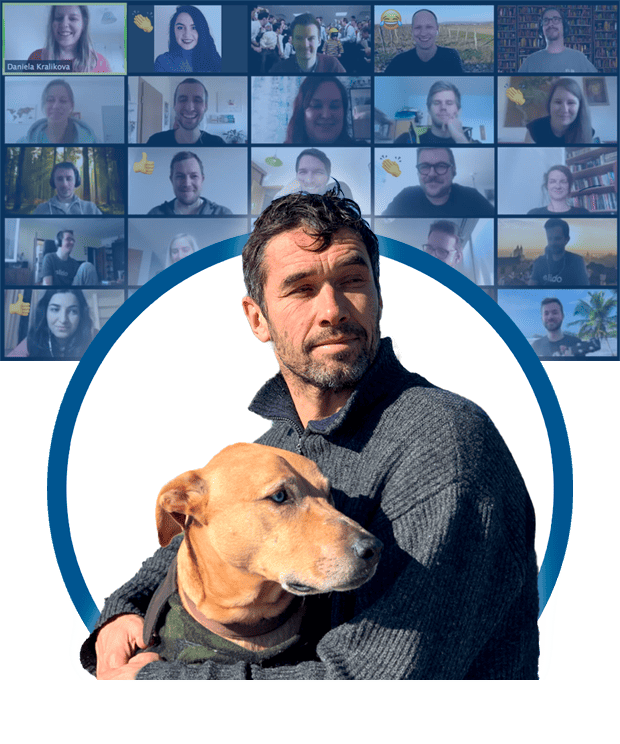Listen above or iTunes / Spotify (Tap the subscribe button – it’s free and keeps you updated!)
Today’s Guest
Sarah Schmidt – Founder of The Big Fix Uganda
I’m so excited to introduce to you today’s guest, Sarah Schmidt, the founder of The Big Fix Uganda. Sarah and her team do incredible work to help improve the lives of the dogs and people in Uganda through providing spay/neuter programs for population control, veterinary care to help fight off disease that can spread to both animals and humans, and dog training education.
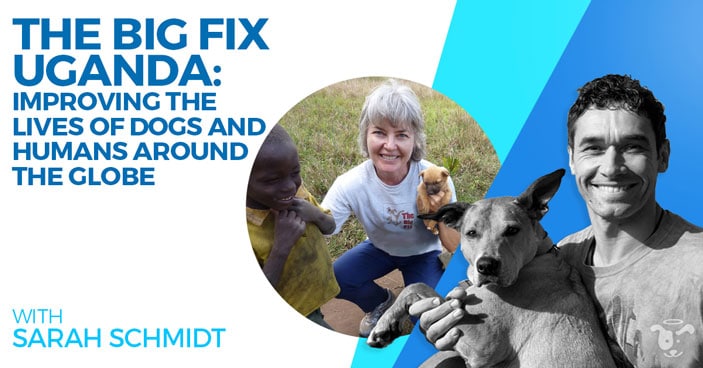
All of these elements are essential to helping improve the health and wellbeing of both the dogs and the people of Uganda, all while promoting important human-animal bonds.
Sadly, the experiences of Acholi people in Northern Uganda are incredibly traumatic. It wasn’t uncommon for children to be kidnapped and forced to serve in the rebel army either as sex slaves or as gun-bearing soldiers.
These types of experiences truly cause a degradation in the social fiber of the people. You don’t have the ability to trust other people, to live in community with other people. The Big Fix Uganda has been a cornerstone in helping heal the people in this community by connecting them with dogs.
Having these programs in place is a HUGE win-win for both the people and dogs in Uganda and has brought about healing (for both the people and the canines) in ways you would never believe is possible.
If you’re interested in learning more about The Big Fix Uganda and the incredible ways they are healing communities and improving the lives of both dogs and people you don’t want to miss today’s podcast!
You’ll Hear About
- [02:15] The Mission of The Big Fix Uganda
- [03:45] The Devastation of the Acholi people in Northern Uganda
- [06:00] How dogs and humans are helping each other heal
- [07:00] The Comfort Dog Project
- [10:00] The Science Behind the Comfort Dog Project
- [11:00] Charles Healing Story with Dog Ogen
- [14:00] The importance of names to the Acholi people
- [17:30] Lucy’s Story
- [21:30] How the Comfort Dog Project Works
- [23:30] How you can help support The Big Fix Uganda
How You Can Get Involved:
If you’re interested in getting involved with The Big Fix Uganda I encourage you to visit their website. On the website you can learn more about the project as well as the various opportunities to support them by giving financially, becoming a volunteer, or donating supplies.
Together we can make an incredible impact on the lives of dogs and the people who love them!
Links & Resources
- Website: https://www.thebigfixuganda.org/
- Facebook: https://www.facebook.com/TheBigFixUganda/
- NTV story about Comfort Dog Project: NTV story about Comfort Dog Project: https://www.youtube.com/watch?v=B3UJUW4awmk
- BBC Video about Filda and Lok Oroma: https://www.youtube.com/watch?v=XCgOu0p7x0c
- Video showing Lucy and Sadik: https://www.youtube.com/watch?v=nmMSbVKcMuw
Learn more by tuning into the podcast!
Thanks for listening—and again, don’t forget to subscribe to the show on iTunes / Spotify to get automatic updates.
Cheers,

~Doggy Dan
|
Voiceover: |
Welcome to the Doggy Dan Podcast Show, helping you unleash the greatness within your dog.
|
|
Doggy Dan:
[00:00:30] |
Hello, and welcome everybody to another Doggy Dan podcast and today, as always, I'm super excited. I have Sarah Schmidt with me today who is the founder and the current president of The BIG FIX Uganda, which is a charity that's been working in, no surprises here, Northern Uganda since 2012 where they run the only vet hospital in the entire Northern Ugandan region, which is home to more than seven million people.
|
|
[00:01:00] |
Just imagine that. You're running the only veterinary hospital for seven million people. Imagine how many dogs there are. And during the 21 years of war in Uganda, which ended in 2006, there was a complete lack of veterinary services in most areas, which resulted in a huge overpopulation of dogs and rabies became widespread.
|
|
[00:01:30] |
So according to Sarah, who we're going to chat to in a second, the animal deaths due to rabies has occurred frequently and still occurs unfortunately today. But there's also a huge, a very deep spiritual and emotional amount of work that goes on through her organization. Looking forward to sharing all of this with you, Sarah. Thank you for coming on today.
|
|
Sarah Schmidt: |
Oh, Dan, thank you so much for having me. And you've been such a generous supporter of our work in Uganda and I just want to thank you for that. And thank you for this opportunity.
|
|
Doggy Dan:
[00:02:00] |
Well, I am a huge believer in your work partly because I love dogs, and partly because I love people. So can you explain a little bit about what you do because it is very unique, which is why I love your charity work. You work with helping both the dogs and the people. Can you share a little bit about, in your own words, what is The BIG FIX? What do you do?
|
|
Sarah Schmidt: |
Yes. So the mission of The BIG FIX Uganda is to improve the health and well-being of the people and animals and to promote human-animal bonds. And we do that by promoting healthcare for animals because when you're living in proximity with the animals, the health of your dogs and cats affects your health and well-being as well.
|
|
[00:02:30] |
So we work with veterinary service. We also do education, school outreach, community education. And we have our Comfort Dog Project which is probably what we're best known for, which is a program of dog companionship aimed at helping war trauma survivors to overcome the debilitating symptoms of PTSD.
|
|
Doggy Dan: [00:03:00] |
Wow. Now, in case you didn't notice, there is a lot of stuff in there, guys. We're talking about dogs with physical issues. We're talking about dogs with rabies and getting vaccinations, all that sort of stuff. We're talking about war victims. I mean I was going to start to talk about the dogs, but do you mind giving us an idea of let's just start with the people.
|
|
|
When you talk about the victims of war, how do these victims of war, because I think we all know PTSD, post-traumatic stress disorder, and that's both men and women. Is that correct?
|
|
Sarah Schmidt: |
Absolutely, yes.
|
|
Doggy Dan: [00:03:30] |
Women have been traumatized by what's going on around them and maybe even to them. Men have been traumatized by what they've been forced or made to do. Am I putting words in your mouth there? Or is that-
|
|
Sarah Schmidt:
[00:04:00] |
No, absolutely. That's correct. I mean the experiences of Acholi people in Northern Uganda are really beyond our comprehension for most of us. They lived for more than 20 years with such uncertainty and a lack of safety. Children were regularly being kidnapped and forced to serve in the rebel army either as sex slaves or as gun-bearing soldiers. They were often forced to kill family members or friends. Even the Ugandan government soldiers were forced to commit atrocities on villagers such as the burning of huts with people inside of them.
|
|
[00:04:30] |
And even at the schools, children routinely were trained how to run away in a certain direction so that they could avoid gunfire from the rebel and government armies. So you can imagine that living in that kind of chaos especially for those who were abducted. The wounds are very deep, and most of the people we worked with were abducted while they were at school, or while they were sleeping in their huts at night.
|
|
[00:05:00] |
They were abducted as children at about the age of 13, 12, and they were either forced to serve as sex slaves in the bush or they were forced to serve as soldiers. And most of them were in the bush fighting for five or more years and came out of the bush with maybe children if they were women, and basically nothing.
|
|
|
So when you lived through that kind of an experience, it really causes a degradation in the social fiber of the people. You don't have the ability to trust other people, to live in community with other people. And so, this was the situation for most people post-war in Northern Uganda.
|
|
[00:05:30] Doggy Dan: |
And so, as I see it, the trust between humans and the ability for humans to trust other humans is kind of shattered and-
|
|
Sarah Schmidt: |
Absolutely.
|
|
Doggy Dan: |
I guess that's where the dogs come in.
|
|
Sarah Schmidt:
[00:06:00] |
Yeah, because what happened was these people who had been abducted and were in the bush for five years fighting, they're dreaming of the day when they would be welcomed back home. Then what they found instead sadly was that when they returned to their villages, they were completely ostracized by the people that they had been longing to return to. They were called killers. No one would talk to them.
|
|
|
And so, you can imagine that being able to trust a human became very difficult. And if you can't trust your fellow humans, it makes it very difficult to live in a society again. And that's, as you say, where the dogs come in.
|
|
Doggy Dan: [00:06:30] |
So can you tell us a little bit about, let's start with the women. So how do the dogs help these women who have been abused and raped? And how can the dogs help them in life?
|
|
Sarah Schmidt:
[00:07:00] |
Well, I'll tell you a couple of stories about two of the women who participated in our first class, which started in January of 2015. The first was Filda, and she's the woman who's the subject of the BBC story that came out in August of 2019. Filda was a single mother of five children when she joined our Comfort Dog Project. In fact, she had a baby strapped to her back as she went through the training.
|
|
[00:07:30] |
And when I first met Filda on the first day of the Comfort Dog Project training class, she was not able to make eye contact. She felt very nervous around other people. She couldn't stand up and even say her name in a group of people. And she basically was having a great deal of difficulty functioning. She also had a young dog she named Lok Oroma, who was quite a challenge for her to train. And it really caused her to really develop an inordinate amount of patience to be able to communicate with Lok Oroma. And that was a very difficult thing for Filda to do to be patient.
|
|
[00:08:00] |
But she was. And when she began seeing results, when she began realizing that her dog was understanding what she was saying, her dog was responding to her, it gave her such a sense of satisfaction that she could accomplish this. And she actually excelled as one of the top people in our class. And by the end of the 20-week training program, I started seeing something quite amazing and that was I started seeing Filda smile.
|
|
[00:08:30] |
Whenever Lok Oroma would respond to her, then she would smile. And this was quite miraculous. And then over time, she began talking to the other people that she was in the project with. She began talking to Francis more, our community psychologist, who manages the project. She began talking to her neighbors. She began talking to other people.
|
|
[00:09:00] |
She started working as a field educator which many of our project graduates do, working for The BIG FIX, helping to educate others in the community about dog welfare. And all of those experiences gave her confidence to the point that now Filda goes to school outreach programs and regularly feels very confident and comfortable talking in front of a thousand children at once.
|
|
Doggy Dan: |
Wow.
|
|
Sarah Schmidt: |
She looks people directly in the eye. She smiles. She's also employed full-time as Northern Uganda's only dog welfare officer. She goes to people's homes. She inspects the homes. She confiscates dogs that she feels are not being properly cared for. And she's completely changed her level of confidence and it empowered her working with this dog.
|
|
[00:09:30] |
And she still has this beautiful bond with her dog that exists today.
|
|
Doggy Dan: |
Brilliant. Yeah, just having a purpose in life.
|
|
Sarah Schmidt: |
Exactly.
|
|
Doggy Dan: |
And feeling like we're good at something and we have a reason for getting up in the morning. And that love connection with the dog and confidence because we're doing a good job. We all know what that's about.
|
|
Sarah Schmidt: [00:10:00] |
Absolutely. And as you know, Dan, there's science behind this theory of this project. Everyone who has loved a dog can relate to the fact that dogs make us a feel better. That's a no brainer. But there's actually a chemical reaction that happens in the body when you pet a dog, when you're comforting a dog, when a dog is comforting you. It's a release of oxytocin which is the same thing that you would feel when you're holding a newborn baby.
|
|
|
And that's the science behind our project.
|
|
Doggy Dan: [00:10:30] |
Yeah, brilliant. And so, it feels like a good time to move on to, so how does the project help the men who've survived the war and come back kind of all alone? We've talked about the oxytocin, it feels like a good link.
|
|
Sarah Schmidt:
[00:11:00] |
Yeah, absolutely. So let me tell the story about Charles and his dog, Ogen Rwot. So Charles was initially abducted into the rebel army and forced to serve for five years. He then escaped but was compelled to serve in the government army for another five years. During that time, the atrocities that he saw and was forced to participate in were really too much for anyone to be able to handle. And in his case, which is not unlike many other men, he resorted ... He would numb the pain by using alcohol and he became an alcoholic.
|
|
[00:11:30] |
And in addition to the wartime trauma, he also lost his wife and his only son as a result of the war. And so, he was left completely alone with all of these horrific nightmares and flashbacks about all these things that he had been involved in. And he just became an alcoholic. And Charles was also in our first year class with very high symptoms severity of PTSD when he began the program. And we gave him this dog, Ogen Rwot.
|
|
[00:12:00] |
And Charles said that Ogen Rwot, a female dog, was kind of like his daughter and he felt like he couldn't reach out to other people but this dog was so excited to see him when he would return home. The dog was always there with him, always concerned about him, and when he started feeling anxious or nervous, the dog learned to come and just put her head in his lap and that comforted him and made him feel better.
|
|
[00:12:30] |
And one time when I was visiting Charles, I told him, "Charles, I hear that you've stopped drinking alcohol." And he said, "Yes, I haven't touched alcohol." And I said, "Well, what happened?" And he said, "Well, Ogen Rwot didn't like the smell of it, and so I had to quit."
|
|
Doggy Dan: |
Wow. There's a lesson for us all.
|
|
Sarah Schmidt: |
Absolutely. And he's doing really well today.
|
|
Doggy Dan: |
Brilliant.
|
|
Sarah Schmidt: [00:13:00] |
Primarily because he has that relationship with his dog. In fact, we have a little problem with some of our guardians because we check the health of these dogs once a month, and some of the dogs are too fat and his dog is one of those. He's very thin but he gives all his food to his dog, because that's a way of showing love. So that's the one thing we have to try to counsel him.
|
|
Doggy Dan: |
Too beautiful. And just for us to talk about this, so Charles and Ogen Rwot, if you go to my website, I'll put the video that your beautiful BBC video about Filda and Lok Oroma-
|
|
Sarah Schmidt: |
Oh, fantastic.
|
|
[00:13:30] Doggy Dan: |
... and Charles and Ogen Rwot. I'll put all those videos and links and photos on my website which will be theonlinedogtrainer.com/thebigfix, just for people who are listening. You can't go wrong really. Could you tell us a little bit, I'm jumping around here, but do you know off the top of your head, you may not, what does Ogen Rwot mean?
|
|
Sarah Schmidt: |
Ogen Rwot means trust in God.
|
|
Doggy Dan: |
Beautiful.
|
|
Sarah Schmidt: [00:14:00] |
The Acholi people have kind of a practice of using names as a way to send a message to the outside world. I once met a young woman who was helping us with one of our village field clinics and she told me that her name in English meant you have wronged your family. And the reason she was given that name is because her father was having an affair with another woman when her mother got pregnant.
|
|
Doggy Dan: |
Gosh.
|
|
Sarah Schmidt:
[00:14:30] |
And so, it's kind of a passive-aggressive way of sending a message out to the world about how you're feeling about things. So it's very normal that our dogs have some pretty unique and interesting names. Ogen Rwot being one of them.
|
|
Doggy Dan: |
Yes, and what about Lok Oroma. Do you know what Lok Oroma means?
|
|
Sarah Schmidt:
[00:15:00] |
Yeah, Lok Oroma means something like watch your words because your words are hurtful. And for instance, one of our dogs is named [Agonya 00:14:47], which means perseverance. And then there's the name Tam-Pira, which means think about me because a lot of these people feel that they were invisible after everything that they had been through.
|
|
|
And Matal Got is one of our dogs. That name means mountains last forever but not human.
|
|
Doggy Dan: |
Oh, gosh.
|
|
Sarah Schmidt: |
And Watmon means relatives can never forgive.
|
|
Doggy Dan: |
Wow.
|
|
Sarah Schmidt:
[00:15:30] |
And one of my favorite is Petaga. We have one of our dogs, Petaga. You'll recognize her in photos because she has a scar around her muzzle. She was caught in a snare trap of where we managed to rescue her, and her name means I am not shaken by whatever you do.
|
|
Doggy Dan: |
Incredible.
|
|
Sarah Schmidt: |
Pretty nice commentary.
|
|
Doggy Dan: |
It really makes you wonder just some of the names we give our dogs. I'm thinking of mine, Jack and Moses and Inca.
|
|
Sarah Schmidt:
[00:16:00] |
Yes, it's really an interesting thing. There's no place I've ever been where I've heard about that being part of the culture. And I think it's just another of the many fascinating things about the Acholi people.
|
|
Doggy Dan:
[00:16:30] |
It's beautiful. I always thought it was funny to call your dog Kevin or Allan, but they don't really have depths to it other than being a bit of a laugh. Kevin? Kevin, Kevin the dog. So, one of the things you were saying, when you were talking about Charles and Ogen Rwot and Filda and Lok Oroma was just how ... It doesn't matter what part of the world you're in. It doesn't matter what culture, ethnicity. We are all so similar and that we also have these desires to be loved, to have someone to love, to be able to contribute, to be significant.
|
|
Sarah Schmidt: |
Absolutely.
|
|
Doggy Dan: |
And we all want to come home and somebody would be happy to see us and somebody just be able to feel this and it's the ability of a dog to feel us whether we're happy, whether we're sad. It's huge.
|
|
Sarah Schmidt: [00:17:00] |
And Dan, these dogs are amazing. They're not pure bred dogs. They're street dogs. They are plain, brown, medium-sized dogs in Uganda. And these dogs just intuitively figure out how to help their person and it all stems from having that very strong bond. So our 20-week training program really focuses on developing that bond between the dog and the guardian.
|
|
[00:17:30] |
Like for instance, there's one dog guardian team, Lucy and her dog, Sadik. Lucy was forced to serve for five years as a rebel soldier. She was abducted when she was 12 years old. And she actually advanced to being an officer in the rebel army. She's just an incredibly strong woman. And she came back, was ostracized and hated by everyone in her village. And so we gave her this dog, Sadik.
|
|
[00:18:00] |
And she quickly became so bonded with this dog. In fact, she doesn't like to be referred to as Lucy. She prefers Mama Sadik. And this dog, within weeks of being placed with her, learned how to help her. She would have frequent flashbacks, frequent nightmares. And when she would be experiencing a flashback, Sadik just intuitively learned to start distracting her and trying to get her to play, which she did because she loved him.
|
|
[00:18:30] |
And so, Lucy said that over time, she didn't have time to be living in those flashbacks anymore because whenever she started experiencing one, her dog distracted her. And she told me after some time, she didn't dream about the nightmares of the war anymore. She dreamed about playing with Sadik.
|
|
Doggy Dan: |
Wow.
|
|
Sarah Schmidt: |
And that's what these dogs are doing for the people. It's really amazing.
|
|
Doggy Dan:
[00:19:00] |
Yeah. I think one of the things I love is the fact that when you talk about it, I feel like I know that if I turn up in Uganda and meet these dogs, I know I'll be able to connect instantly. And I know many people listening would be the same. If you can connect with a dog who's a pedigreed dog in America or the UK or Australia or wherever you're listening, if you know how to connect with a dog, you can connect with a dog worldwide.
|
|
|
And so that's what's incredible if it come out of the heart and as long as they're friendly with people. They'd read you, you'd read them and boom, no different. And you'd be like, "Wow."
|
|
Sarah Schmidt: |
Absolutely.
|
|
Doggy Dan: |
It's a dog. Beautiful.
|
|
Sarah Schmidt: |
And we're waiting for that day when you come to Uganda. We're waiting anxiously.
|
|
[00:19:30] Doggy Dan: |
I would so love to. I got a busy schedule. Otherwise-
|
|
Sarah Schmidt: |
I know you do.
|
|
Doggy Dan: |
... Yeah, I'm coming. There's a lot of places I'm looking forward to visiting. So you've touched on so many things there, I'm already going, "Gosh, we could have [inaudible 00:19:45] each of these one things." So that's what we called the Comfort Dog Project. Is it kind of right where you're helping the people overcome some of the war dramas and traumas of war?
|
|
[00:20:00] Sarah Schmidt: |
Yes, absolutely. In fact, we're actually helping the dogs and helping the people at the same time because these dogs were rejected, Lok Oroma who was Filda's dog, you'll see in the BBC broadcast, she was actually found on a rubbish heap. Shed been thrown away as a puppy on a rubbish heap.
|
|
[00:20:30] |
And so, these dogs would have no chance for a good life, but when they've come in part of our project, we make a lifetime commitment to them just as we do the guardians. And we've had, some of our guardians have died, which means that we immediately become involved in either re-homing the dog or making sure that another family member can care for the dog. We do monthly health checks on the dogs. We really maintain that relationship with the dogs over time. |
|
|
So it's a win for the dog and it's a win for the person at the same time. |
|
Doggy Dan: [00:21:00] |
Brilliant. So just roughly for people listening, how many dogs have you worked with or got in the project or have been through the project would you say? How much were there?
|
|
Sarah Schmidt: |
So as of right now, we have graduated 56 dogs in our program.
|
|
Doggy Dan: |
Beautiful.
|
|
Sarah Schmidt: |
And we're looking forward to having another class starting early next year.
|
|
Doggy Dan: |
And those 56 dogs all go on to be kind of looked after by a dog guardian?
|
|
Sarah Schmidt: [00:21:30] |
Yes. So these dogs, they actually ... We pair them with a war trauma survivor and then together, they go through the 20-week training program and they graduate together. And so, yeah. And then they live happily ever after.
|
|
Doggy Dan: |
Beautiful. And so I'm presuming, I'm guessing, is there quite a list, a waiting list for guardians, people who would like one of these dogs?
|
|
Sarah Schmidt:
[00:22:00] |
Definitely. And what's interesting is when we first started this project in 2015, on Saturdays, our guardians would walk with their dogs to The BIG FIX and people would actually laugh at them. And I thought to myself, "Oh, no, what have I done? Here, these people are already ostracized by their communities and now, I've created something that's causing their neighbors to laugh at them."
|
|
[00:22:30] |
But what happened over time was that these people who are initially laughing noticed that, "Wow, those dogs are looking pretty clean. Those dogs are looking so healthy. And wow, that's pretty amazing that that person knows how to teach their dogs to sit or stay or walk on a leash and look at that nice dog collar." And pretty soon, people started coming to our gate and saying, "Hey, how do we join this project?"
|
|
[00:23:00] |
But what we do is we actually have village counseling sessions for war trauma survivors in five locations. And so, all of our Comfort Dog Project participants come from those counseling groups because those people have already demonstrated a desire to overcome their situation and they've already been trying to work on overcoming their symptoms of PTSD.
|
|
|
And so from those groups, yes, I would say that most people in those groups want to be part of the Comfort Dog Project. And we have probably about 200 people in those groups. So, selecting 12 is very challenging and we would definitely like to get to the point where we could have a bigger class than that.
|
|
Doggy Dan: |
Yeah. And what's holding you back from working with more dogs and helping more people? Is it a financial thing?
|
|
[00:23:30] Sarah Schmidt:
[00:24:00] |
It's financial, but also with the staff that we have right now, quality is very important to us. It takes a lot of commitment to help a person to turn their life around. And we also feel that if we had too many people at once, that we may not be able to have the success rate that we have. We would need more staff members. We would need another community psychologist. We would need other people working on dog welfare and dog training.
|
|
[00:24:30] |
So, with our existing staff, we feel like the number that we've done is the number that we can do an excellent job with. And we know this works because since our very first year, we have done pre and post-program assessments of PTSD symptom severity in our participants. So, most of the participants enter our project with a diagnosis of posttraumatic stress disorder and/or major depression. And their symptom severity is usually severe.
|
|
|
And then we assess how they're doing after the 20-week training program, and in almost all cases, we've seen a reduction in symptom severity and over time, we have seen an elimination of symptoms in many of our project participants.
|
|
[00:25:00] |
For instance, Filda, who I talked to about who entered the program with severe symptoms, she now has no symptoms of posttraumatic stress disorder. So, this does work.
|
|
Doggy Dan: |
Amazing. So cool. I'm going to jump around here because I got a few questions. But tell me first of all, you said that people laughed at the dogs. They used to laugh at the men or people walking the dogs. What is the stigma attached to having a dog? Was it the type of dog or do people not have dogs as pets in Uganda? What's the situation?
|
|
[00:25:30] Sarah Schmidt: |
It's just that there's a long history of people living with dogs in Northern Uganda. Dogs were used for protection, for hunting. But you never would touch your dog. I mean that would be unheard of because dogs have mange, dogs have fleas, dogs have ticks.
They smelled bad. They bite people occasionally. So, there would be no reason for most people to ever want to touch a dog.
|
|
[00:26:00] |
In addition, the war caused a lot of fear about dogs because for the rebel soldiers, they were constantly dealing with dogs trying to protect the villages. And for the civilians, they would deal with government forces using dogs in an aggressive manner against them.
|
|
[00:26:30] |
So, most people feared dogs and the idea of touching a dog was very foreign. And I remember when we first started doing these village field clinics, I would work in the recovery area when we would do surgeries and I would be putting the dogs on a towel which was hysterical, the funniest thing in the world that people had seen, that we would be using a towel to put a dog on? And then I would get down on the ground and trim the toenails, which would just cause huge groups of people to burst out laughing. They'd never seen such a funny thing before.
|
|
[00:27:00] |
But you have to remember that also people didn't realize that dogs have feelings. I've had teachers come to me and say, "You know what? Until you came to our school, I didn't realize that dogs feel pain. I didn't realize that dogs can be happy about things." So, there's kind of a disconnect.
|
|
|
And when we started seeing the shift in that was in teaching people how to wash their dogs because obviously, washing a dog can help promote good health and teaching them, giving them a spot-on flea and tick treatments. And once we started teaching people how to wash and groom their dogs, there was this shift. Some people would carry their dogs home because they didn't want them to get dirty walking back home after a clinic.
|
|
[00:27:30] |
And there is this shift and people, when their dogs are clean, started touching the dogs. And as you know, when you start touching a dog, a dog is going to start feeling comfortable with you. A dog is going to start showing appreciation. You're going to touch your dog more. And so, this is when we started seeing bonds developing, and that was one of the factors that help us to come up with the idea for the Comfort Dog Project.
|
|
[00:28:00] Doggy Dan: |
It's beautiful. There's something inside me ... I've read a post and it said, "What is wrong with the world? What is wrong?" And there's a very wise person sat there and said, "We have disconnected from spirit." And what that means is spirit, if you think of it as energy, if you think of it as God, universe, it's this connection between us.
|
|
[00:28:30] |
And what we're touching into here is this ... I don't know how to put it but as humans, sometimes, you got to laugh that we really are ... There's not much common sense. We're talking about this. There's not much common sense sometimes left with us humans. We're talking about it before we pressed record. And then it's like where's the common sense?
|
|
|
We struggled to be able to see that these animals have feelings, that they can be happy. It's not rocket science. It's not complicated and it takes me back to something we're talking about earlier, that what I loved about your project is the dogs there and what's going on is not much different from what's happening in California.
|
|
[00:29:00] |
And I have a specific example of what I mean that one of my very good friends, one of my best friends called Paul ... I won't give his surname, but Paul if you're listening, I'm talking about you. He said, "I'm going to get a dog." And he's worked on from the UK. We worked together and he moves to California and very successful and suddenly, he's going to get a dog. "What dog should I get? What breed?" And I'm like, "Well, just get a nice ... Meet the dog and just see if you connect with it." And he's like, "Okay, okay."
|
|
[00:29:30] |
He hasn't got a clue and he watched my program training on how to train and connect with the dogs. And he says, "It's going well. I'm loving it," and then a few weeks later, he's like, "This is incredible what's happening. The dog is falling in love with me." And then a few weeks later, he's like, "Dan, this is insane. I can't believe I've lived my whole life without, like having a dog in my life." And then I spoke to him not long ago, he said, "Dan, this dog is my life. I can't believe the connection I have with this animal. It loves me. it loves me," and it's like, yeah.
|
|
[00:30:00] |
And yet how many of us can associate with that? We're never happier than when we are looking into the eyes of our dog, and the dog is looking into our eyes, and we know that the dog is thinking of nothing else but us.
|
|
Sarah Schmidt: |
Exactly.
|
|
Doggy Dan: |
And there's a deep connection.
|
|
Sarah Schmidt:
[00:30:30] |
Exactly, and they don't judge us. Their love is so unconditional. And this is why they're effective in helping war trauma survivors because as part of dealing with war trauma, talking about what you were involved with is important. And people judged you, and dogs don't. And so, one thing we do is we tell our participants to talk to their dogs. And it might sound crazy to some people but it actually works, because as you said, all you get back from the dog is unconditional love and devotion.
|
|
Doggy Dan:
[00:31:00] |
Yes. I mean it's an area which is huge, being able to forgive ourselves and be loved and know that we're loved regardless. I do work with men in men's group, helping men become better men and I myself included in that. And a lot of it is about shifting shame, and shame is effectively being unlovable. And it's almost the opposite of unconditional love that we can be accepted and loved. And our dogs just know nothing else. Yeah, incredible.
|
|
Sarah Schmidt:
[00:31:30] |
And you can imagine the shame that people feel when they've been forced to participate in such egregious acts as in times of war. So, you're absolutely right, that's a critical point.
|
|
Doggy Dan:
[00:32:00] |
Moving on again, jumping back onto ticks, fleas, manges and rabies, you touched on those things. I'm just coming from New Zealand where we don't ... We have a few ticks maybe and a couple of fleas, but can you tell us how widespread is it? Is it something that's easily dealt with? Just a little bit about that, how much of that stuff do you see and can you help with?
|
|
Sarah Schmidt: |
Rabies is major public health concern in Northern Uganda. And it's primarily because of the lack of services and because of the extreme poverty. Rabies still kills 59,000 people a year in the world and most of those deaths occur in Asia and Africa. And Uganda is one of the epicenters, one of the highest incidents of rabies deaths, not only due to animals but also people.
|
|
[00:32:30]
[00:33:00] |
In November, we vaccinated dogs in Minakulu Trading Center in Oyam District, Northern Uganda. We do that because two years ago, there was a very much loved woman who was a restaurant owner there. And one Sunday morning, she was opening the doors of her restaurant and all of a sudden, this rabid dog attacked her out of nowhere. And she was basically struggling for her life with this dog who had gone mad from the disease. I mean this is not a fault of dog. This is a virus that affects them as well.
|
|
[00:33:30] |
And in the process of struggling with this dog, she even broke her arm to let you know how aggressive dogs can become when they're afflicted with the rabies virus. And unfortunately, because she wasn't given proper post-exposure treatment for rabies, she died. And her family, she has five beautiful children. She has an extended family of people just who loved her so much and the entire community loved her so much. She was a very generous person, built a home for her mother. She died the most brutal, horrible death imaginable.
|
|
[00:34:00] |
And so, it's very real to us in Northern Uganda, I would say it's probably safe to say that most people living in Northern Uganda knows someone who has died from rabies, which to me is completely unacceptable because this is a deadly virus, 100% fatal once symptoms appear. But it's also 100% preventable through vaccination of our dogs.
|
|
[00:34:30] |
The challenge is we have to reach 70% vaccination. So to date, The BIG FIX has vaccinated over 72,000 dogs in Northern Uganda but still, we are seeing cases of rabies because it's such a vast region, and there are so many remote areas. In the areas where we have been working, we definitely see a dramatic increase or even absence of rabies cases now. But in other areas, it's still very problematic.
|
|
Doggy Dan: |
How much does it cost like the one in the vaccinations for rabies?
|
|
Sarah Schmidt: |
It costs a dollar. It costs a dollar to vaccinate a dog.
|
|
Doggy Dan: |
One dollar.
|
|
Sarah Schmidt: |
One dollar.
|
|
Doggy Dan: |
And how many dogs are there in Uganda, roughly?
|
|
[00:35:00] Sarah Schmidt:
[00:35:30] |
That's a very good question. We know there are seven million people living in the Northern Uganda region. There hasn't been a really reliable yet dog population survey. We've done surveys in certain parts of Northern Uganda such as the Gulu City area. And surprisingly, even in the Gulu City area, we found in surveying households that nearly 100% of households have at least one dog. So, from this, we can surmise that the dog population in Northern Uganda is definitely well over tens of thousands, I mean it could be over a hundred thousand dogs, we don't know.
|
|
|
But we've been concentrating mostly in the Gulu City area and the Gulu district area.
|
|
Doggy Dan: |
So, you're saying in Northern Uganda, there could be almost a hundred thousand or few more than that even dogs, is that right?
|
|
Sarah Schmidt: |
We really don't know because it's very common to have many dogs in the rural villages.
|
|
[00:36:00] Doggy Dan: |
But very roughly, you're saying you've vaccinated 72,000 dogs, you said? |
|
Sarah Schmidt: |
Yes. That's been primarily in the Gulu district area, and we've expanded out a little bit from that area. It used to be in 2012 that there were regular suspected cases of rabies. In fact, on our very first day of going to do a village field clinic in August of 2012, the district veterinary officer asked us to go and euthanize a rabid dog which had been captured in the storage building, which we did.
|
|
[00:36:30] |
I mean, on my first day out working on rabies vaccinations, I saw with my own eyes a rabid dog. But these days, those incidents in the areas where we've been working are very few. But still, there are so many. And this is a vast region, and we have a lot of work to do.
|
|
Doggy Dan: |
Yeah. Wow. But it certainly seems doable. It's not like there's 23 million dogs and it costs $150 per vaccination, and you've only done 3%.
|
|
Sarah Schmidt: |
Exactly.
|
|
[00:37:00] Doggy Dan: |
The numbers are opposite. You've done so many, so I really do wish you all the best.
|
|
Sarah Schmidt: |
Thank you.
|
|
Doggy Dan: |
And I think this brings us onto ... I always like to do a bit of a shout-out for people who want to know more, who go, "I would love to just maybe financially help or maybe just support, I don't know, by telling friends." There's so many ways to help. What would be the best website for people to go to, Sarah, to find out more?
|
|
[00:37:30] Sarah Schmidt: |
Thank you so much, Dan. Our website is www.thebigfixuganda.org. You can also follow us on Facebook, The BIG FIX Uganda, or the Comfort Dog Project. We have two pages. And we're on Instagram as BIG FIX Uganda and on YouTube as The BIG FIX Uganda.
|
|
Doggy Dan: |
Brilliant. And I'll grab all of those URLs and links, and whatever you call them, put them on our website page.
|
|
Sarah Schmidt: |
Thank you so much.
|
|
[00:38:00] Doggy Dan: |
No, it's all good, theonlinedogtrainer.com/thebigfix, or just search for The BIG FIX and it will come up. And just one of the things I just want to say that I do love so much about your work is the accounting of where the money goes is so precise and transparent. It's not like you go, "Where's all the money going?" You can see it. You can see every nut, bolt and screw pretty much where the money goes and it's all going on vaccinations and training, and it's great.
|
|
[00:38:30] Sarah Schmidt: |
Thank you. That's something that's very important to us. And every year, we publish our financial statement showing where every dollar goes. So, you can see how much we pay our staff members, how much we spend on veterinary supplies which are our number one expense, how much we spend on everything. So, thank you for touching that.
|
|
Doggy Dan: |
No, you're welcome. Are we allowed to put that up on our website?
|
|
Sarah Schmidt: |
Absolutely.
|
|
Doggy Dan:
[00:39:00] |
So, anybody who's interested in charity and how much money is spent where, anyone who's sitting on a pot of gold, you got $20,000, you want to ... And you go, I know. Even if you've only got $50, I mean let's be serious. Even if you're going, "Oh, I don't got that much, I've only got $50. " $50? Yeah, do you want to say what $50 is?
|
|
Sarah Schmidt:
[00:39:30] |
$50 is a lot of money for us. I mean we can spay five female dogs, spay, vaccinate, de-worm and treat for fleas and ticks and give a dog collar in five dogs for $50 in Northern Uganda. And those dogs already have loving homes. I mean that makes a huge impact in spaying a female dog.
|
|
Doggy Dan: |
Do you hear that guys? Yeah, you hear that, 50 bucks.
|
|
Sarah Schmidt:
[00:40:00] |
Also, $50, we can vaccinate 50 dogs. That's one small village of dogs. $50, we can send one of the top police officials and one of our Comfort Dog Project teams to a school to do a visit. One of our education team members is one of the top police officials in Northern Uganda who goes out talking to kids about why it's illegal to do criminal acts against animals. I mean he's a pretty compelling guy.
|
|
|
And so, $50 makes a big impact at The BIG FIX Uganda, for sure.
|
|
Doggy Dan:
[00:40:30] |
And so, I think that's another thing I love about what you do. Not only is it transparent where the money goes but also it has such a huge impact. Whether I'm helping a dog down the road or whether I'm helping a dog live a better life in California or China or Taiwan or Uganda, it doesn't really matter to me. People are people and dogs are dogs, and I love all.
|
|
Sarah Schmidt: |
Thank you.
|
|
Doggy Dan: |
I'm just thinking, looking at the time going we really should wrap this up. We've had a good chat. There's so much more we could chat about. I'm thinking, have I missed anything? Is there anything you can think of that I've missed that you really want to touch on and if you were to say or share some other story or something you feel is important to you that you'd love to share?
|
|
[00:41:00] Sarah Schmidt: |
I think I would just share this story of one of our Comfort Dog Project guardians, Lucy.
|
|
Doggy Dan: |
Lucy and Sadik?
|
|
Sarah Schmidt: |
I talked to you a little bit about Lucy and her dog, Sadik, yes. And Lucy was somebody who had children, and she didn't have a way of supporting them. She's a single mother. She has a lot of health challenges, and she's now employed by The BIG FIX Uganda as one of our assistant dog trainers and mentors for new people.
|
|
[00:41:30] |
So, when you're supporting our organization, you're really giving people the opportunity to have dignity and to take care of themselves because we employ as many of them as possible to carry out our mission. So, thank you so much, Dan, for all you do and for the giving the shout-out to our work. We really appreciate it.
|
|
Doggy Dan:
[00:42:00] |
You're welcome. And just touching on that, what I love as well is the loyalty, like you say, the appreciation of these people sometimes blows me away. It's like I've seen the photos, and I'll try and find the one of people standing in queues like a hundred people long in the mid-day sun just because there's somebody there who's going to do vaccinations. And I think about how we complain when we go to the vets and there's three people and we have to wait 20 minutes. These people all stood there.
|
|
Sarah Schmidt:
[00:42:30] |
Yes, Dan. I mean if I could just tell you one other thing. The last time I was there, I came outside in the morning and in front of the hospital, a man was sitting with no shoes on and kind of a rag for a shirt with three dogs. So, I went to talk to him. The man had walked for three days with his dogs to bring them to the hospital. I mean how can you not give everything of yourself to promote this mission when you see that? That's why I am so devoted, it's because the people and this love for their animals, it's quite amazing.
|
|
Doggy Dan: [00:43:00] |
Wow. I don't even know how to summarize or close or finish this one. It's like ... Other than to say, come on, guys. Let's do what we can. If you got 20 bucks, 50 bucks, if you want to just share a video, come and watch ... So, yeah, go to theonlinedogtrainer.com/thebigfix or go to thebigfixuganda.org.
|
|
Sarah Schmidt: |
Dot-org, yes. Thank you.
|
|
Doggy Dan: |
Yeah. I truly wish you all the best and-
|
|
Sarah Schmidt: |
Thank you so much.
|
|
Doggy Dan: [00:43:30] |
... I appreciate your work on behalf of everybody who loves dogs and people. And keep up the great work.
|
|
Sarah Schmidt: |
Thank you so much, Dan. Thank you for all the contributions you've made to helping us with our dog training efforts. We are so grateful to you.
|
|
Doggy Dan: |
Love what you do and love supporting you.
|
|
Sarah Schmidt: |
Thank you.
|
|
Doggy Dan: |
All right, guys, thanks so much for listening. Thank you, Sarah.
|
|
Sarah Schmidt: |
You're welcome.
|
|
Doggy Dan: |
Thank you everybody for listening and to you all, have a great day. And as always, love your dogs.
|
|
[00:44:00] Voiceover: |
You've been listening to another episode of the Doggy Dan Podcast Show, bringing you one step closer to creating harmony with your dog. |
Sign up to receive email updates
Enter your name and email address below and I'll send you periodic updates about the podcast.


